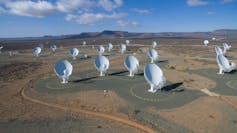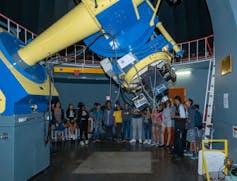South African astronomy began an vital journey twenty years in the past, when an initiative to draw and practice future scientists within the subject welcomed its first group of scholars beneath the Nationwide Astrophysics and House Science Programme.
World class services have been established throughout this era, essentially the most notable of that are the Southern African Massive Telescope (SALT) and the MeerKAT radio telescope, a precursor to the worldwide Sq. Kilometre Array. They add to the South African Astronomical Observatory and Hartebeesthoek Radio Observatory which existed already.
The Nationwide Astrophysics and House Science Programme has performed an important position in making certain that these services weren’t merely operated for the good thing about worldwide companions. It has additionally contributed people with essential information evaluation abilities to the nation’s rising high-tech workforce.
As astronomers who have been a part of this journey – organisers, contributors and beneficiaries – we’re utilizing the twentieth anniversary date to replicate on the programme’s affect and its significance for the nation.
The historical past
South Africa’s astronomical historical past, spanning over 200 years, took a leap in 2000 with the cupboard’s approval for the development of the Southern African Massive Telescope.
Past its scientific affect, the thought was to draw and nurture younger expertise, addressing shortages in scientific and engineering fields in South Africa.

South African Radio Astronomy Observatory (SARAO)
On the time, there have been solely about 40 astronomers with PhDs within the nation. All have been white. This was the results of the racially skewed schooling system throughout the apartheid period.
In 2001, astronomers started getting ready for SALT and future tasks. The Sq. Kilometre Array (SKA) emerged as a possibility to host a giant worldwide radio telescope which may, amongst different issues, examine the beginnings of the Universe. Sadly the scarcity of South African astronomers posed a risk to the success of the 2 tasks, and to Africa’s participation.
Learn extra:
How visionary scientist Bernie Fanaroff put African astronomy on the map
Growing a pipeline
Changing into an expert astronomer requires a PhD in astronomy, physics, or a associated topic. It takes about 10 years to qualify after finishing secondary faculty. At the moment fewer than 1% of black faculty leavers certified to review for a BSc in physics or astronomy.
It grew to become clear that universities wanted to start out co-operating if the panorama was to vary. The nation’s small astronomical group was unfold throughout eight universities and two nationwide services.
A choice was taken to pool sources to ascertain the Nationwide Astrophysics and House Science Programme. On this manner, college lecturers and professionals on the nationwide observatories may all contribute to educating, whereas college students may select from a variety of analysis tasks.
This collaboration, together with the organisation that grew to become the South African Nationwide House Company, centered on guiding college students by means of honours and grasp’s levels. It emphasised cooperation over institutional pursuits and focused younger scientists, particularly these from beforehand deprived communities.
The first aims have been clear:
-
entice college students post-Bachelor of Science
-
recruit from different international locations in Africa
-
entice faculty leavers into BSc physics programmes
-
make participation within the programme a promoting level for all collaborating universities.
Bursaries masking fundamental wants have been essential to draw sensible college students from deprived backgrounds. Funding from non-public foundations, significantly from the Ford Basis, the Mellon Basis and the Canon Collins Belief, added to very fundamental grants from the Nationwide Analysis Basis.
At present, the federal government’s Division of Science and Innovation is the first funder.
Grants are sufficient, slightly than beneficiant. However, college students have developed profitable careers by means of the programme, reworking astronomy and house science in South Africa and past.
Programme participant Pfesesani van Zyl mentioned:
The journey to SALT was a very transformative expertise for me … As a baby rising up in a small city, the notion of pursuing a profession in astronomy appeared like an unattainable dream, particularly as a feminine of color … Nonetheless, that go to shattered these limiting beliefs.
As former beneficiary Roger Deane, now a professor on the College of the Witwatersrand, put it, the programme was pivotal in
Observe file
By mid 2023, the Nationwide Astrophysics and House Science Programme had produced 439 honours graduates and 215 grasp’s levels in astrophysics and house science. One other 27 honours and 21 grasp’s college students are set to graduate shortly, and related numbers of scholars will full their levels in 2024.
A 2023 survey of programme graduates had 230 respondents, together with 53 graduates from 19 different African international locations. The biggest numbers have been from Uganda, Madagascar, Ethiopia, Kenya, Zambia and Sudan. Many have returned residence.
Former participant Miriam Nyamai mentioned:
Collaboration with worldwide researchers by means of the programme enabled me to do world-class analysis, attend worldwide conferences, and provides talks on my work.
Affect
The affect of the programme’s graduates extends far past academia. Many have launched into profitable careers throughout various sectors, together with business, schooling and authorities.
Graduates have participated in thrilling astronomical discoveries. These embody producing the first photos of black holes with the Occasion Horizon Telescope, discovering among the most distant galaxies but recognized, and utilizing SALT to analyze the remnants of some very huge binary stars and weird lively black holes at nice distances.
The work of many people has been recognised by nationwide and worldwide our bodies and programme graduates are in key educating and analysis posts in South African universities. Over 30 are employed within the astronomy nationwide services and the nationwide house company, whereas some have prestigious positions elsewhere on the earth. South Africa now has over 200 certified astronomers, not all of them from the Nationwide Astrophysics and House Science Programme.
However, it stays a problem to fill vacant astronomer posts in South Africa. Many components contribute to this, together with funding, alternatives outdoors academia, and the dearth of clear profession paths. The Nationwide Astrophysics and House Science Programme can solely ever be a part of the answer to those complicated systemic issues.
Future instructions

SAAO
The programme has developed since its institution. College students now should navigate intensive volumes of intricate information of various sorts, from varied sources. Machine studying and synthetic intelligence are indispensable. College students should know what these instruments can and can’t do as they push the boundaries of our comprehension. This can be a problem for each college students and their mentors.
The primary impediment now lies, because it did 20 years in the past, in serving to college workers to collaborate throughout establishments in such a manner that their work is recognised and rewarded. This requires senior directors to know that inter-university collaborations are an funding in their very own establishments in addition to within the development of South African science.
To commemorate the twentieth anniversary of the Nationwide Astrophysics and House Science Programme, a two-day symposium has been organised in January 2024, hosted on the College of Cape City in South Africa.




